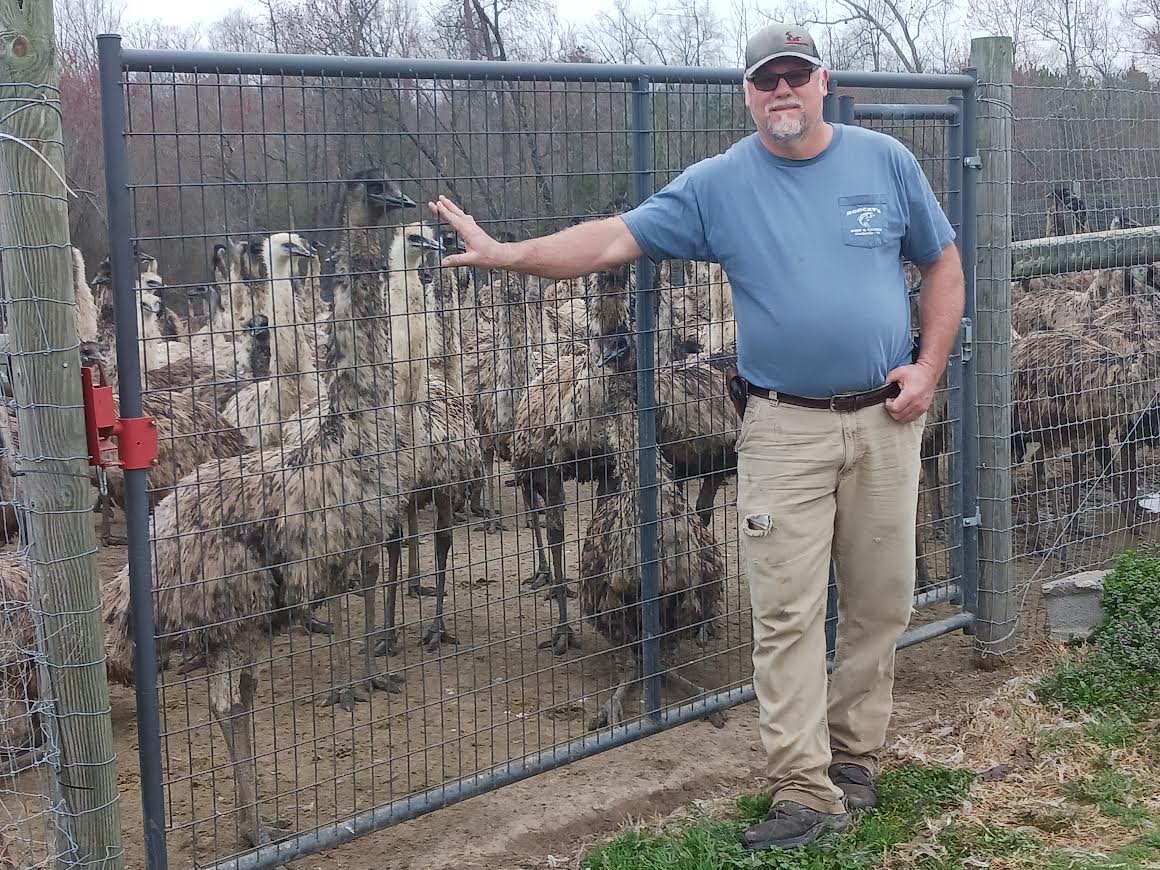Welcome!

Jay Winslow of Liberty stands beside one of his emu pens. He owns the largest emu farm in the country.
‘I’ll have the emu, hold the beef’
LIBERTY — It all began with Blue Emu, a topical pain reliever whose key ingredient is emu oil.
“We started raising emus for Blue Emu for its fat, which has anti-inflammatory properties,” said Jay Winslow, owner of Amaroo Hills Emu Farm. “It’s a transdermal oil that goes through the skin.”
That was in November 2011 when Winslow was a project manager for a heavy construction company. By 2013, there was so much business that the Winslow family moved from south of Asheboro to a farm north of Liberty, just over the Guilford County line. The property is owned by Jerry Bowman, Winslow’s father-in-law, and the farm has been in the family for several generations.
While Jay began farming full-time, his wife JaAnna continued to commute to her Asheboro job and their three children — Karsan, Collin, Cassie — changed schools.
“Our main goal now is (raising emus) for meat,” Winslow said. “I went out on my own at this location.”
Then in 2014, he partnered with Ngon Nguyen, who owned an emu farm in Ashland City, TN. Nguyen got into farming after being bitten by ticks and developing the alpha-gal mammalian meat allergy. As a result, he couldn’t eat red mammalian meats such as beef, pork and lamb.
Then Nguyen discovered that emu was a perfect red meat replacement for beef, tastes just like beef, but was safe for his allergy. Emu also is the most nutritious meat.
The problem was, there was no reliable source of emu meat. So Nguyen decided to raise his own. And by partnering with Winslow, he could devote most of his time with marketing, sales and distribution.
Meanwhile, Winslow had been “building his property from the ground up by hand. Raising emus is not easy. That’s why there are not many farmers,” he said.
Emus, which are native to Australia, are omnivores, meaning they are both carnivores and herbivores, eating insects but also grasses. But, WInslow said, the birds don’t get much nutrition from grass. So he had to develop a grain formula, working with NC State University and also with Allen McNeill.
His mob, or herd, of emus now totals some 2,000 birds, most in a large pasture and others in smaller pens, one for breeders. The Winslows must gather eggs every evening and take the fertile eggs to be incubated in the farm’s hatchery.
An emu egg is several times the size of a chicken egg and requires more than 50 days to hatch.
“They’re fragile when they’re young, especially their legs,” Winslow said of the hatchlings. “So we have to have a special infrastructure. We have some loss but not great, since we’ve been learning and improving. We have a 60- to 70-percent hatch rate.”
Now boasting the largest emu farm in the country, Amaroo Hills still can’t produce enough birds, Winslow said.
“We’re having trouble keeping up with demand. We send out meat direct to consumers, mostly individuals and some restaurants,” he said. “People buy it because they like the meat and it’s an alternative to beef. There’s a growing demand from people with health issues.”
Winslow said emu meat is on the American Heart Association’s list of healthy proteins.
Amaroo Hills will send a tractor-trailer load of about 100 emus to the processing plant, which then sends the meat back. The packages are kept in a walk-in freezer until time for shipping to customers.
But before being shipped out, the selected birds must be rounded up. That’s why they’re kept in smaller pens, Winslow said, with several people herding them out of the larger pasture. After all, he said, “they can run 35 miles an hour.”
To learn more about Amaroo Hills Emu Farm and the products offered, visit https://amaroohills.com.
